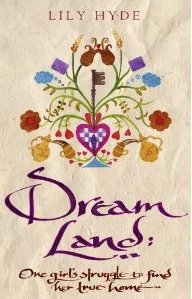Dream land by Lily Hyde

Walker Books,London, 2008.
(Age: 12+)Cover blurb:'One girl's struggle to find
her true home'. It is the story of the return of a Crimean Tatar
family from exile in
Uzbekistan to the Crimea, told through the eyes of a young girl.
This beautifully written story is based on real events and is sponsored
by Amnesty International.It deals with the Crimean Tatars who
survived exile by Stalin after the war and who returned to their
homeland under perestroika. They find their old homes possessed by
Russians who were moved in and many of their old villages destroyed, in
much the same way as surviving Jews did when they returned to Poland
after the war. This little known story is vividly captured here. Safi,
about 12 or 13, arrives with her extended family to build a house by
themselves in face of hostility from the locals who see them as
unwanted intruders.
Lily Hyde conveys well the beauty of the Crimea, the fierce love of
homeland which survives exile and opposition, the strength of a united
loving family, the power of numbers against government might and the
pros and cons of risking all for a dream.The eye-catching
colourful
cover has a Tatar embroidery of a house key growing out of a
heart
from which sprout tendrils producing hearts, flowers and coffee pots.
The keys and coffee pots were kept by the exiles through years of
travail, as powerful symbols of what they loved and had lost, and
served to sustain their dream in the face of overwhelming odds. The
wonderful power of oral story telling of ethnic and family history is
captured here by Safi listening to grandfather's stories.
Safi's voice is that of a normal, very likeable girl trying to
make
sense of what is happening to her family. She unwittingly becomes a
heroine in a dramatic ending, and her realistic portrayal by Lily
Hyde
makes it possible for students to relate to her.Unfortunately,
girls
who are Safi's age may be too young to be attracted to, or fully
appreciate this book, as readable as it is.
It is sad that this book is unlikely to get the wide readership it
deserves.Better, curious students will enjoy and learn
from it, but
it does not have enough across the board appeal to become a class text.
Modern history students would gain a real feel for the human impact of
dictatorship. One for the library.
Kevyna Gardner